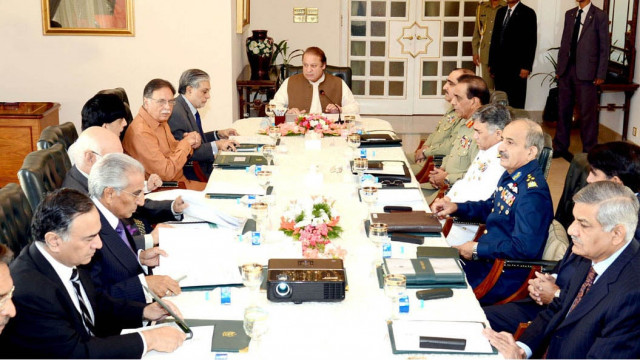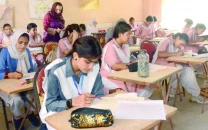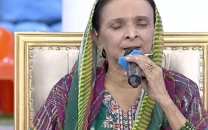Battling militancy: Govt revives National Security Council
DCC agrees militants must lay down arms for talks; meeting briefed on ongoing ceasefire violations by India.

Prime minister Nawaz Sharif chairing the meeting of Defence committee of cabinet. PHOTO: PID
It took Nawaz Sharif 15 years, plus several twists of fate, to change his mind about the National Security Council (NSC), a body that has been largely inactive since 2008. Nawaz bitterly opposed its creation when the then army chief General Jehangir Karamat floated the idea in October 1998, nearly three decades after General Yahya Khan conceived the need for such a body.
Subsequently Karamat was forced out of the job as a result. Pervez Musharraf, the general who replaced Karamat, announced the NSC’s formation when he deposed the government of Nawaz Sharif and re-created it in 2004.
On Thursday, Nawaz Sharif’s government decided to reconstitute the National Security Council (NSC) to improve coordination between the civil and military institutions in order to deal with a nagging insurgency that has killed and maimed thousands of Pakistanis over the last few years.
The reconstitution was ordered in a meeting of the Defence Committee of the Cabinet (DCC) on Thursday. It was the first meeting of the DCC since the PML-N came to power following its victory in the May 11 elections. The committee discussed a four-point agenda, including matters relating to the security situation and counter-terrorism efforts.
Prime Minister Nawaz Sharif will head the National Security Council which will include his cabinet members – ministers for foreign affairs, defence, interior and finance – three services chiefs and the chairman Joint Chiefs of Staff Committee. The NSC will focus on the national security agenda with the aim of formulating a national security policy that will become the guiding framework for its subsidiary policies: defence policy, foreign policy, internal security policy, etc. In his opening remarks, the prime minister said that “Pakistan was facing formidable challenges domestically, while far-reaching developments were taking place in the region and the DCC provided the platform to deliberate on these issues and craft an appropriate response.”

In the context of regional peace and stability, the DCC discussed the evolving situation in Afghanistan. The premier said that a peaceful, stable and united Afghanistan was in Pakistan’s vital interest and would contribute to the impetus of peace and prosperity in the region. “Pakistan will fully support the international community’s efforts for peace and reconciliation in Afghanistan and it will also work to comprehensively upgrade its bilateral relations with Afghanistan in all dimensions,” he added.
The DCC decided that the government would not hold any dialogue with homegrown extremists, unless they renounced violence and surrendered their weapons. The government will fight those refusing to lay down their arms.
The committee also discussed escalating tensions with India triggered by ongoing skirmishes along the Line of Control (LoC) and foreign policy matters. Director General Military Operations Major General Amir Riaz briefed the meeting on the latest situation at LoC. He said that Pakistani troops were exercising restraint despite repeated ceasefire violation by Indian forces.
“India has violated the ceasefire agreement 240 times this year. Eight soldiers, including two officers, have been martyred as a result. Continuous shelling has also destroyed numerous houses,” said Maj Gen Riaz.
The DCC strongly condemned ceasefire violations by Indian troops but emphasised that Pakistan would maintain the truce in letter and spirit. “The prime minister said all possible channels must be used to halt ceasefire violations. However, he insisted that Pakistan would prefer dialogue to settle all outstanding issues with India,” Sartaj Aziz, the prime minister’s adviser on national security and foreign affairs, told The Express Tribune.
Apart from the DGMO, Sartaj Aziz and Foreign Secretary Jalil Abbas Jilani also briefed the meeting. Finance Minister Ishaq Dar, Interior Minister Chaudhry Nisar Ali Khan, Information Minister Pervez Rashid, Special Assistant to the Prime Minister for Foreign Affairs Tariq Fatimi, three services chiefs, ISI and MI heads and chairman Joint Chiefs of Staff Committee attended the meeting.
Analysts say that by reviving the NSC the prime minister wants to debunk the impression that the PML-N-military doctrine does not go well. “This move could be an attempt to preclude the mishaps of the past,” defence analyst Lt Gen (retd) Talat Masood told The Express Tribune. “A man who had earlier resisted the establishment of the National Security Council has himself revived it – this is not an ordinary thing,” he added.
Published in The Express Tribune, August 23rd, 2013.



















COMMENTS
Comments are moderated and generally will be posted if they are on-topic and not abusive.
For more information, please see our Comments FAQ